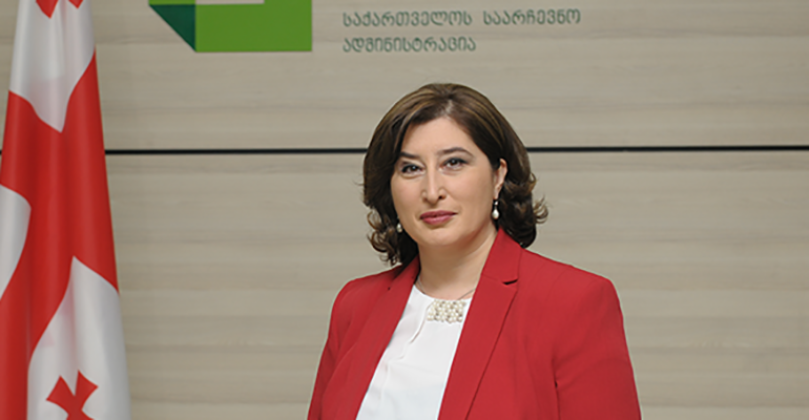
Election Administrator and 2017 Joe C. Baxter Award Recipient
Since 1995, the International Foundation for Electoral Systems (IFES) has conducted a range of assistance activities to support the development of democratic elections and political processes in Georgia. The Central Election Commission (CEC) has been a critical partner in IFES’ work in Georgia. In this Q&A, CEC Chair Tamar Zhvania discusses IFES’ work with the Georgian election management body and efforts to ensure electoral access for persons with disabilities and promote gender equality.
To read her remarks during the Eighth Annual Charles T. Manatt Democracy and 2017 Joe C. Baxter Awards , please click here.
How have IFES and the CEC’s collaboration strengthened Georgia’s electoral process and election administration?
In collaboration, IFES and the CEC have affected many aspects of the election environment and built the capacity of the CEC to administer elections. With IFES support, the CEC widely contributed to the development of the inclusiveness of elections. Several successful projects have also been implemented to enhance the engagement of ethnic minorities in electoral processes.
Institutional capacity was further bolstered with the CEC’s 2015-2019 Strategic Plan, Annual Action Plans and Electoral Integrity Management Plan. Important steps have also been taken forward in advancing our human resources, which was ensured through IFES-supported trainings and expert assistance. IFES also played an important role in promoting the CEC’s civic education programs and Training Center.
The CEC has emerged as a leader among state institutions in the field of gender programming. Expert assistance provided by IFES helped the CEC in developing its first Gender Equality Policy.
What role do election management bodies play in citizens’ perception of the credibility of an election? What is Georgia’s experience in this regard?
Several factors contribute to making elections credible: inclusiveness, transparency and accountability to citizens. If these principles are in place, the public has confidence in the election process. Election management bodies’ performance and their independence directly affect citizens’ perception of the credibility of elections.
Over the past couple of years, Georgia’s electoral system has undergone many changes. In 2012, Georgia witnessed its first peaceful and constitutional transition of power, an important democratic milestone for the country. The transparency of the electoral process, proactive communication with electoral stakeholders, voter outreach campaigns and citizen engagement policies resulted in a rise in public trust toward the CEC. Now the key step is to maintain and further increase that trust.
What initiatives has the CEC recently implemented to help ensure electoral access for persons with disabilities?
The CEC consistently works toward developing an accessible election environment for persons with disabilities. IFES has supported very significant projects for promoting accessible elections. In 2012, with the financial support of IFES, a needs assessment was conducted and a comprehensive database was developed for persons with disabilities. IFES assisted the CEC in providing magnifying sheets for visually impaired voters at polling stations and in preparing mobile ramps at polling stations. With the support of IFES, the CEC developed its official webpage with the special features that ensure accessibility of election-related information for persons with disabilities. With IFES support, the CEC also developed guidelines for Provincial Election Commission members for assisting persons with disabilities.
Are there barriers you have confronted being a woman in a leadership position?
I have never personally confronted barriers as a woman throughout my career, but it does not mean women in my country do not face obstacles in leadership positions. That is why I am fully committed to working on the promotion of woman’s rights and supporting a gender-balanced environment – a key to keeping our democracy healthy.
What is the CEC doing to ensure gender equality?
The CEC’s Standing Council for Gender Equality has developed a Gender Equality Policy. The main goals and objectives of the Gender Equality Policy are to strengthen the CEC’s organizational capacity to establish gender equality and promote the empowerment of women in electoral processes.
We also continue designing programmatic interventions that engage external stakeholders, mainly civil society organizations, political parties and youth groups, in achieving gender equality and empowering women in all aspects of the electoral process.









